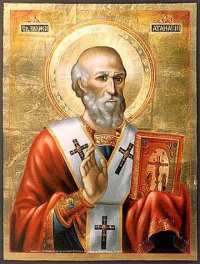 I dagens audiens i Vatikanet snakket pave Benedikt om den hellige Athanasius (296-373). Om Athanasius kan vi lese på www.katolsk.no:«Den hellige Athanasius ble født rundt 296 i Alexandria i Egypt. På den berømte kateketiske skolen hos biskop Alexander av Alexandria fikk han en glimrende gresk utdannelse som innbefattet gresk litteratur og filosofi, retorikk, rettsvitenskap og kristen doktrine. Hans kjennskap til Bibelen var eksepsjonell. Som 21-åring ble han i 318 diakonviet og utnevnt til sekretær for biskop Alexander. Som diakon ledsaget han i år 325 sin biskop til det første konsil (kirkemøte) i Nikea i Bithynia (i dag Iznik i Tyrkia).
I dagens audiens i Vatikanet snakket pave Benedikt om den hellige Athanasius (296-373). Om Athanasius kan vi lese på www.katolsk.no:«Den hellige Athanasius ble født rundt 296 i Alexandria i Egypt. På den berømte kateketiske skolen hos biskop Alexander av Alexandria fikk han en glimrende gresk utdannelse som innbefattet gresk litteratur og filosofi, retorikk, rettsvitenskap og kristen doktrine. Hans kjennskap til Bibelen var eksepsjonell. Som 21-åring ble han i 318 diakonviet og utnevnt til sekretær for biskop Alexander. Som diakon ledsaget han i år 325 sin biskop til det første konsil (kirkemøte) i Nikea i Bithynia (i dag Iznik i Tyrkia).
Etter keiser Konstantins omvendelse gjorde han kristendommen til offisiell statsreligion i hele Romerriket, og dermed kunne alle trygt bekjenne seg som kristne. Til gjengjeld ble den teologiske uenigheten som hadde plaget de tidligere kristne bevegelser, skarpere på 300-tallet og i de etterfølgende århundrene. Stridighetene gjaldt spesielt definisjonen av inkarnasjonen: Hvis Jesus var både Gud og menneske, hadde han så to naturer? Og i så fall, hvilket innbyrdes forhold hadde disse to? Den nye religionen tiltrakk mennesker med vidt forskjellig bakgrunn, tradisjoner, ritualer og forestillinger om det guddommelige. Det var av avgjørende betydning å definere Kristi natur, men det var svært vanskelig. Det dreide seg om definisjonen av «Faderen», «Sønnen» og «enbåren».»
I dag sa paven om Athanasius, at han har vist oss at den som nærmer seg Gud, ikke trekker seg bort fra mennesker, tvert imot kommer han derved nærmere menneskene. Og han beskrev også den aleksandrinske helgenen as a «passionate theologian of the incarnation of the ‘Logos,’ the Word of God,» and «the most important and tenacious adversary of the Arian heresy which then threatened faith in Christ by minimizing His divinity, in keeping with a recurring historical tendency which is also evident in various ways today.»
Athanasius participated in the Council of Nicaea, when bishops established «the symbol of faith … which has remained in the tradition of the various Christian confessions and in the liturgy as the Nicene-Constantinopolitan Creed.» There it is affirmed that «the Son is ‘of one substance’ with the Father, precisely in order to highlight His full divinity which was denied by the Arians. … The fundamental idea behind St. Athanasius theological labors was precisely that God is accessible, … and that though our communion with Christ we can truly unite ourselves to God.»
Nonetheless, the Arian crisis did not end with the Council of Nicaea «and on five occasions over a period of 30 years, … Athanasius [bishop of Alexandria from 328] was forced to abandon his city, spending 17 years in exile.» In this way, however, «he was able to support and defend in the West … the Nicene faith and the ideals of monasticism.»
This saint’s most famous work «is his treatise ‘On the Incantation of the Word’,» in which he affirms that the Word of God «was made man that we might be made God; and He manifested Himself by a body that we might receive the idea of the unseen Father; and He endured the insolence of men that we might inherit immortality.»
Athanasius is also the author of meditations upon the Psalms and, above all, of one of the most popular works of ancient Christian literature, «the ‘Life of St. Anthony,’ the biography of St. Anthony Abbot which … made a great contribution to the spread of monasticism in East and West.»
The life of Athanasius, like that of St. Anthony, the Pope concluded, «shows us that ‘those who draw near to God do not withdraw from men, but rather become truly close to them’.»

St.Athanasius vist virkelig vei i sin kamp mot det nesten verdensompsennende arianske kjetteri. Om vi bare kunne følge hans eksempel i kampen mot modernismen….
Nyttig påminnelse. Fant dette under forberedelse til søndagens preken – Matt 11:11-19. Den som lever nær Faderen, lever nær mennesker. Jesus ble kalt «venn med tollere og syndere». Det første er en yrkelsgruppe – folk med frynsete rykte (det finnes det vel en del av) og det andre er vel folk flest (som det er mest av – igrunne alle). Hva slags rykte har menigheten? Kirken? «Si meg hvem du omgås med, så skal jeg si deg hvem du er.»